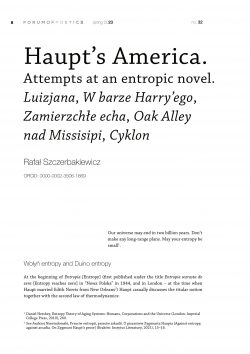
Rafał Szczerbakiewicz
A b s t r a k t
In works by Zygmunt Haupt, the motif of entropy was a unique moment associating the speculative character of modern scientism with modernist prose. The scientific explanation – physics – is used to interpret the world’s natural and social history. Haupt extends the connotations of the second law of thermodynamics, typically conceptualized in terms of humanities as a pessimistic perspective on the passing of energetic livelihood of life, the human world, civilization. At the beginning of his experience of America, it provided him with both hope and hopelessness. The paper analyzes similarities between Haupt’s and Faulkner’s prose, as well as formal similarities between their worldviews. Writing about the Delta, both authors are interested in the imbalance between nature and civilization, which leads to a crisis of both nature and human society. Entropy turns out to be a paradoxical trace of hope in the growing disorder which may be heralding a new system, and with it – a form of younger entropy.





